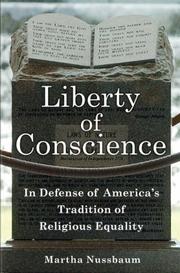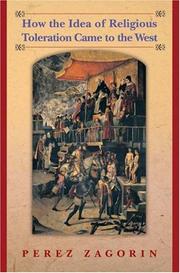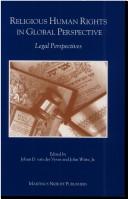| Listing 1 - 10 of 15 | << page >> |
Sort by
|
Book
ISBN: 9025947220 Year: 1998 Publisher: Schoten Ten Have / Uitgeverij Westland n.v.
Abstract | Keywords | Export | Availability | Bookmark
 Loading...
Loading...Choose an application
- Reference Manager
- EndNote
- RefWorks (Direct export to RefWorks)
gewetensvrijheid --- het Besturend Lichaam --- traditie --- wetticisme --- voorspellingen --- intimidatie --- 1975 --- Gods ingrijpen

ISBN: 9780465051649 9780465018536 0465051642 9786612450181 0786721944 Year: 2008 Publisher: New York Basic Books
Abstract | Keywords | Export | Availability | Bookmark
 Loading...
Loading...Choose an application
- Reference Manager
- EndNote
- RefWorks (Direct export to RefWorks)
The respect for religious difference has formed the bedrock of our nation and made equality possible. Yet today we are told that ?moral values"?code for a government shaped by religious concerns?must be the keystone of our social compact.A rich and compelling chronicle of an essential idea, Liberty of Conscience tells the story of America's great tradition of religious freedom. Philosopher Martha Nussbaum's ambitious book is both a work of history and a pointed rejoinder to conservative efforts to break down barriers between church and state.
General ethics --- Religious studies --- United States --- Freedom of religion --- 342.731 --- 172.3 --- Vrijheid van godsdienst. Gewetensvrijheid --- Religie en staat. Gewetensvrijheid. Intolerantie. Tolerantie --- 172.3 Religie en staat. Gewetensvrijheid. Intolerantie. Tolerantie --- 342.731 Vrijheid van godsdienst. Gewetensvrijheid --- Liberty. --- Freedom of religion - United States. --- United States of America --- liberty of conscience --- religion --- America --- religious equality --- religious history --- religious philosophy --- secularization --- religion and law --- religion and tradition --- the First Amendment
Book
ISBN: 9043501344 Year: 2000 Publisher: Kampen Kok
Abstract | Keywords | Export | Availability | Bookmark
 Loading...
Loading...Choose an application
- Reference Manager
- EndNote
- RefWorks (Direct export to RefWorks)
Human rights --- Religious studies --- 342.731 --- Freedom of religion --- Identity (Psychology) --- -Freedom of religion --- Freedom of worship --- Intolerance --- Liberty of religion --- Religious freedom --- Religious liberty --- Separation of church and state --- Freedom of expression --- Liberty --- Vrijheid van godsdienst. Gewetensvrijheid --- Religious aspects --- Law and legislation --- -Vrijheid van godsdienst. Gewetensvrijheid --- 342.731 Vrijheid van godsdienst. Gewetensvrijheid --- Freedom of religion. --- Religious aspects. --- godsdienstvrijheid --- identiteit --- godsdienstpsychologie --- ethiek --- Christendom --- Jodendom --- Islam
Book
ISBN: 9055735191 9789055735198 Year: 2004 Publisher: Budel Damon
Abstract | Keywords | Export | Availability | Bookmark
 Loading...
Loading...Choose an application
- Reference Manager
- EndNote
- RefWorks (Direct export to RefWorks)
verdraagzaamheid --- Social ethics --- sociale ethiek --- Spinoza, Baruch --- Grotius, Hugo --- Erasmus, Desiderius --- Tolerantie --- Toleration --- Tolérance --- Verdraagzaamheid --- 211 Politieke filosofie --- 172.3 --- 316.647.5 --- 172 --- Religie en staat. Gewetensvrijheid. Intolerantie. Tolerantie --- Intolerantie. Tolerantie. Verdraagzaamheid --- 316.647.5 Intolerantie. Tolerantie. Verdraagzaamheid --- 172.3 Religie en staat. Gewetensvrijheid. Intolerantie. Tolerantie --- Netherlands --- Twin Towers --- Pim Fortuyn --- tolerantie --- Nederland --- grenzen van tolerantie

ISBN: 0691092702 0691121427 9780691121420 1306142806 1400850711 Year: 2003 Publisher: Princeton Princeton university press
Abstract | Keywords | Export | Availability | Bookmark
 Loading...
Loading...Choose an application
- Reference Manager
- EndNote
- RefWorks (Direct export to RefWorks)
Religious intolerance, so terrible and deadly in its recent manifestations, is nothing new. In fact, until after the eighteenth century, Christianity was perhaps the most intolerant of all the great world religions. How Christian Europe and the West went from this extreme to their present universal belief in religious toleration is the momentous story fully told for the first time in this timely and important book by a leading historian of early modern Europe. Perez Zagorin takes readers to a time when both the Catholic Church and the main new Protestant denominations embraced a policy of endorsing religious persecution, coercing unity, and, with the state's help, mercilessly crushing dissent and heresy. This position had its roots in certain intellectual and religious traditions, which Zagorin traces before showing how out of the same traditions came the beginnings of pluralism in the West. Here we see how sixteenth- and seventeenth-century thinkers--writing from religious, theological, and philosophical perspectives--contributed far more than did political expediency or the growth of religious skepticism to advance the cause of toleration. Reading these thinkers--from Erasmus and Sir Thomas More to John Milton and John Locke, among others--Zagorin brings to light a common, if unexpected, thread: concern for the spiritual welfare of religion itself weighed more in the defense of toleration than did any secular or pragmatic arguments. His book--which ranges from England through the Netherlands, the post-1685 Huguenot Diaspora, and the American Colonies--also exposes a close connection between toleration and religious freedom. A far-reaching and incisive discussion of the major writers, thinkers, and controversies responsible for the emergence of religious tolerance in Western society--from the Enlightenment through the United Nations' Universal Declaration of Human Rights--this original and richly nuanced work constitutes an essential chapter in the intellectual history of the modern world.
Christian church history --- -Tolerance, Religious --- -Godsdienstige tolerantie. Godsdienstpolitiek --- Religious tolerance --- Christianity --- History. --- 172.3 --- 322 --- 172.3 Religie en staat. Gewetensvrijheid. Intolerantie. Tolerantie --- Religie en staat. Gewetensvrijheid. Intolerantie. Tolerantie --- 322 Godsdienstige tolerantie. Godsdienstpolitiek --- Godsdienstige tolerantie. Godsdienstpolitiek --- Tolerance, Religious --- Toleration --- Christianity&delete& --- History --- Tolérance religieuse --- Christianisme --- Histoire --- Histoire. --- religious toleration --- the West --- history --- protestantism --- christianity --- persecution --- Tolérance religieuse
Book
ISBN: 9789025958190 Year: 2008 Publisher: Kampen Ten Have
Abstract | Keywords | Export | Availability | Bookmark
 Loading...
Loading...Choose an application
- Reference Manager
- EndNote
- RefWorks (Direct export to RefWorks)
Christian religion --- S20090209.JPG --- godsdienst --- filosofie --- christendom --- 2 --- 1 --- religieuze overtuigingen --- moderne christendom --- Nederland --- kerkelijke instituten --- onderdrukking --- sociale controle --- vrijheid --- gelijkheid --- broederschap --- seculiere waarden --- emancipatie van het individu --- gewetensvrijheid
Book
ISBN: 2275023925 9782275023922 Year: 2003 Volume: 235 Publisher: Paris LGDJ
Abstract | Keywords | Export | Availability | Bookmark
 Loading...
Loading...Choose an application
- Reference Manager
- EndNote
- RefWorks (Direct export to RefWorks)
Sous l'angle juridique, les mouvements à caractère sectaire ne sont pas des groupements de croyants comme les autres. L'examen, dans le cadre de l'ordre juridique français, de l'exercice de la liberté de religion par les membres de ces groupements souvent qualifiés de " sectes ", montre qu'ils offrent la particularité de pouvoir exercer les droits et libertés qu'ils refusent pourtant à autrui. Développant des systèmes de croyances religieuses ou non, ils agissent aux marges du droit par des pratiques, activités ou comportements illégaux ou illicites. Recherchant une extériorisation sans bornes de leurs croyances, en raison d'une logique d'appartenance forte, voire exclusive, ils tendent à méconnaître les normes les mieux établies et les plus fondamentales de l'ordre juridique républicain qui prévaut en France. L'ignorance du principe de laïcité est à cet égard emblématique en ce qu'elle exprime tout à la fois le rejet du respect de la liberté de conscience, de la séparation entre sphères publique et privée, ainsi que de la citoyenneté, moteur de la République. Dès lors, les mouvements sectaires se distinguent profondément des cultes et sont susceptibles de connaître un régime juridique spécifique, ainsi que le montre la loi du 12 juin 2001 tendant à renforcer la prévention et la répression des mouvements sectaires portant atteinte aux droits de l'homme et aux libertés fondamentales. Dans ce cadre, les autorités publiques jouent un rôle singulier, apparemment en rupture avec l'attitude de non-intervention qui prévaut classiquement en matière religieuse. Bien sûr, le caractère libéral et individualiste de l'ordre juridique français conduit les autorités publiques à devoir respecter les croyances sectaires, mais surtout, il lui assigne une mission visant à cantonner, voire à sanctionner, les comportements et activités sectaires de nature à nuire aux droits et à la dignité de la personne humaine. La politique de vigilance et de lutte contre les dérives sectaires trouve ainsi sa justification dans la nécessaire protection des droits de l'homme que garantit l'ordre juridique au travers de certains principes et normes juridiques.
Human rights --- France --- Freedom of religion --- Sects --- Liberty of conscience --- Liberté religieuse --- Sectes --- Liberté de conscience --- Law and legislation --- Droit --- 342.731 <44> --- Vrijheid van godsdienst. Gewetensvrijheid--Frankrijk --- 342.731 <44> Vrijheid van godsdienst. Gewetensvrijheid--Frankrijk --- Liberté religieuse --- Liberté de conscience --- la liberté de religion --- les mouvements à caractère sectaire --- l'ordre juridique français --- les sectes --- les croyances religieuses --- les libertés fondamentales --- la loi du 12 juin 2001 --- Sectes -- France --- Religion et droit -- France

ISBN: 9042910895 9789042910898 Year: 2002 Publisher: Leuven Peeters
Abstract | Keywords | Export | Availability | Bookmark
 Loading...
Loading...Choose an application
- Reference Manager
- EndNote
- RefWorks (Direct export to RefWorks)
Islam --- Human rights --- Europe --- Muslims --- Freedom of religion --- Religion and state --- Musulmans --- Liberté religieuse --- Religion et Etat --- Civil rights --- Droits --- 342.731 <4> --- 297 <4> --- -Islam --- -Muslims --- -Religion and state --- -State and religion --- State, The --- Mohammedans --- Moors (People) --- Moslems --- Muhammadans --- Musalmans --- Mussalmans --- Mussulmans --- Mussulmen --- Religious adherents --- Mohammedanism --- Muhammadanism --- Muslimism --- Mussulmanism --- Religions --- Freedom of worship --- Intolerance --- Liberty of religion --- Religious freedom --- Religious liberty --- Separation of church and state --- Freedom of expression --- Liberty --- Vrijheid van godsdienst. Gewetensvrijheid--Europa --- Islam. Mohammedanisme--Europa --- -Religious aspects --- Law and legislation --- -Vrijheid van godsdienst. Gewetensvrijheid--Europa --- -342.731 <4> --- 342.731 <4> Vrijheid van godsdienst. Gewetensvrijheid--Europa --- Liberté religieuse --- Islam - Europe. --- Muslims - Civil rights - Europe. --- Freedom of religion - Europe. --- Religion and state - Europe. --- faith --- education --- language and culture --- religious groups --- Muslim communities --- religious life --- religious freedom --- State and religion --- minority religion --- Islamic customs --- Islamic rituals --- political participation --- non-Muslim societies --- classical Islam law --- Islamic identity --- European Union --- the neutrality of the State

ISBN: 9041101780 9041101772 9041101764 9789041101778 9789041101785 Year: 1996 Publisher: The Hague Nijhoff
Abstract | Keywords | Export | Availability | Bookmark
 Loading...
Loading...Choose an application
- Reference Manager
- EndNote
- RefWorks (Direct export to RefWorks)
Human rights --- Freedom of religion --- Freedom of religion (International law) --- Religious aspects --- 342.731 --- Basic rights --- Civil rights (International law) --- Rights, Human --- Rights of man --- Human security --- Transitional justice --- Truth commissions --- Religious liberty (International law) --- International law --- Freedom of worship --- Intolerance --- Liberty of religion --- Religious freedom --- Religious liberty --- Separation of church and state --- Freedom of expression --- Liberty --- 342.731 Vrijheid van godsdienst. Gewetensvrijheid --- Vrijheid van godsdienst. Gewetensvrijheid --- Law and legislation --- Liberté religieuse --- Liberté religieuse (Droit international) --- Droits de l'homme (Droit international) --- Freedom of religion. --- Human Rights. --- -Freedom of religion --- -Basic rights --- -Religious aspects --- religion --- human rights --- legal perspectives --- religious liberty --- United Nations
Book
ISBN: 9055733644 9789055733644 Year: 2002 Publisher: Budel Damon
Abstract | Keywords | Export | Availability | Bookmark
 Loading...
Loading...Choose an application
- Reference Manager
- EndNote
- RefWorks (Direct export to RefWorks)
Nederland is niet zo verdraagzaam als men vaak veronderstelt. Intolerantie lijkt onuitroeibaar. Toch is de verdraagzaamheid in de loop van de eeuwen op vele gebieden toegenomen. In de multiculturele samenleving van deze tijd staat de verdraagzaamheid tussen mensen uit verschillende culturen en religies in het centrum van de aandacht. Dit helder geschreven boek biedt een overzicht van het Europese denken over verdraagzaamheid en intolerantie sinds het begin van onze jaartelling. Aan de hand van grote denkers komen argumenten voor en tegen diverse vormen van verdraagzaamheid aan de orde. Daarnaast wordt de actuele problematiek van de hedendaagse multi-culturele samenleving geanalyseerd. De auteur belicht het zoeken naar oplossingen langs de wegen van de vrijheid, de gelijkheid en de solidariteit. (Bron: covertekst)
Migration. Refugees --- Social ethics --- Sociology of culture --- 322 --- 172.3 --- #A0312A --- 668.6 Multiculturele samenleving --- 261.7 --- Nederland --- geschiedenis --- multiculturele samenleving --- verdraagzaamheid --- Godsdienstige tolerantie. Godsdienstpolitiek --- Religie en staat. Gewetensvrijheid. Intolerantie. Tolerantie --- De Kerk en de burgerlijke macht: Kerk en Staat; godsdienstvrijheid; verdraagzaamheid; tolerantie:--theologische aspecten --- 492 --- 94 --- 325 --- 172 --- Toleration --- History. --- 261.7 De Kerk en de burgerlijke macht: Kerk en Staat; godsdienstvrijheid; verdraagzaamheid; tolerantie:--theologische aspecten --- 172.3 Religie en staat. Gewetensvrijheid. Intolerantie. Tolerantie --- 322 Godsdienstige tolerantie. Godsdienstpolitiek --- Bigotry --- Intolerance --- Tolerance --- Virtues --- Discrimination --- History --- #gsdbS --- intolerantie --- de multiculturele samenleving --- religie --- vrijheid, gelijkheid en solidariteit
| Listing 1 - 10 of 15 | << page >> |
Sort by
|

 Search
Search Feedback
Feedback About UniCat
About UniCat  Help
Help News
News